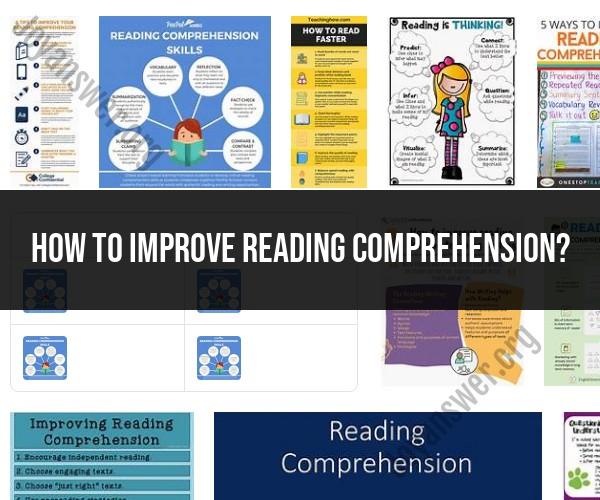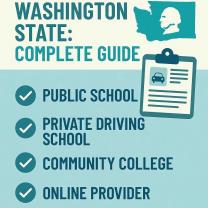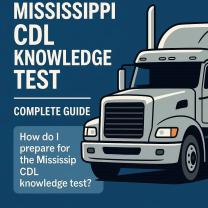How to improve reading comprehension?
Improving reading comprehension is a valuable skill that can benefit you in various aspects of life, from academic success to professional development. Here are some effective strategies to enhance your reading comprehension:
Preview the Text: Before diving into the reading, take a few moments to preview the text. Scan the headings, subheadings, and any illustrations or diagrams. This can give you a sense of the main ideas and structure of the material.
Set a Purpose: Determine why you are reading the text. Are you reading for information, entertainment, analysis, or something else? Having a clear purpose can help you stay focused on what you want to gain from the reading.
Active Engagement: Engage with the text actively by asking questions and making predictions as you read. Consider what you already know about the topic and what you expect to learn. This keeps your mind actively processing the information.
Take Notes: Jot down key points, summaries, or questions in the margins of the text or in a notebook. Note-taking helps you synthesize information and provides a reference for later review.
Highlight and Annotate: Use highlighters, underline, or annotate the text to mark important passages, unfamiliar words, or sections you want to revisit. Be selective in what you highlight to avoid overloading the text with markings.
Chunking: Break longer texts into manageable chunks or sections. Read one section at a time, and take brief breaks in between to reflect on what you've read.
Summarize: After finishing a section or the entire text, summarize the main ideas in your own words. This practice reinforces your understanding and helps you remember key points.
Question the Text: Develop a habit of asking questions while reading. Who are the main characters? What is the central conflict? What is the author's main argument? Asking questions helps you stay engaged and critically analyze the content.
Vocabulary Building: Enhance your vocabulary by looking up the meanings of unfamiliar words. A strong vocabulary improves comprehension and your ability to grasp subtleties in the text.
Read Actively: Try to visualize what you are reading. Form mental images of characters, settings, or concepts. This can make the text more vivid and memorable.
Revisit and Review: After completing the reading, take some time to review your notes, summaries, and highlighted sections. Reinforce your understanding of the material by revisiting key points.
Practice Regularly: Reading comprehension is a skill that improves with practice. Challenge yourself with a variety of reading materials, including different genres, topics, and formats.
Join a Reading Group: Joining a book club or reading group can provide opportunities for discussion and deeper analysis of texts. Hearing others' perspectives can broaden your understanding.
Use Online Resources: Take advantage of online resources, such as audiobooks, podcasts, and interactive reading platforms, to engage with texts in different ways and improve comprehension.
Stay Patient and Persistent: Improving reading comprehension takes time and effort. Don't get discouraged if you encounter challenging texts. Keep practicing and seeking opportunities to enhance your skills.
Remember that reading comprehension is a skill that can be developed and refined over time. Be patient with yourself, and use a combination of these strategies to become a more effective and confident reader.
Proven Techniques to Enhance Reading Comprehension Skills
Here are some proven techniques to enhance reading comprehension skills:
- Preview the text: Before you start reading, take a few minutes to preview the text. This will give you a general understanding of the topic and help you to focus your attention while you are reading.
- Set a purpose for reading: What do you want to learn from the text? Once you know your purpose, you can read more actively and focus on the information that is most important to you.
- Read actively: As you read, ask yourself questions about the text. What is the main idea? What are the supporting details? How does this information relate to what I already know?
- Summarize the text: After you finish reading, take a few minutes to summarize the text in your own words. This will help you to check your understanding and to identify any areas where you need to reread or clarify.
Strategies for Boosting Your Ability to Understand and Retain Information
Here are some strategies for boosting your ability to understand and retain information:
- Use mnemonic devices: Mnemonic devices are memory aids that can help you to remember information. For example, you could use a song, acronym, or rhyme to remember a list of items or a set of instructions.
- Take breaks: If you are reading a long or complex text, take breaks every 20-30 minutes to give your brain a chance to rest and consolidate the information.
- Teach someone else: One of the best ways to learn something is to teach it to someone else. Try to explain the text to a friend, family member, or classmate. If you can explain the information in your own words, you are more likely to remember it yourself.
Building Strong Reading Comprehension Habits for Academic Success
Here are some tips for building strong reading comprehension habits for academic success:
- Read regularly: The more you read, the better your reading comprehension skills will become. Make time to read every day, even if it is just for a few minutes.
- Read a variety of texts: Read different types of texts, such as fiction, non-fiction, newspapers, magazines, and academic articles. This will help you to develop your vocabulary and your ability to understand different types of writing.
- Use a dictionary: If you come across a word that you don't know, look it up in a dictionary. This will help you to build your vocabulary and to better understand the text.
- Ask for help: If you are struggling with a particular text, don't be afraid to ask for help from a teacher, classmate, or parent. They can help you to understand the text and to develop your reading comprehension skills.
By following these tips, you can enhance your reading comprehension skills and boost your ability to understand and retain information. This will help you to succeed academically and in your personal life.













